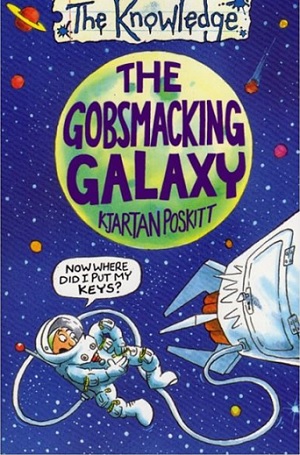Dec 30, 2025
Dec 30, 2025
 The Gobsmacking Galaxy (‘gobsmacking’ is roughly equivalent to ‘amazing’) is an excellent and delightful book for the children written by Kjartan Poskitt. “This gobsmacking guide gives you mind-boggling information about our galaxy… and beyond.” goes the blurb on the back cover. It is a fabulous book that invites the children to marvel at the secrets of the universe with the extraordinary popular science author, Kjartan Poskitt. They can go on a grand tour of the solar system, or go skiing on Mars and meet a sad creature from Pluto as well as learn incredible facts about red giants, white dwarves and supernovas.
The Gobsmacking Galaxy (‘gobsmacking’ is roughly equivalent to ‘amazing’) is an excellent and delightful book for the children written by Kjartan Poskitt. “This gobsmacking guide gives you mind-boggling information about our galaxy… and beyond.” goes the blurb on the back cover. It is a fabulous book that invites the children to marvel at the secrets of the universe with the extraordinary popular science author, Kjartan Poskitt. They can go on a grand tour of the solar system, or go skiing on Mars and meet a sad creature from Pluto as well as learn incredible facts about red giants, white dwarves and supernovas.
In 159 pages this book promotes popular science writing and gives the child reader many interesting facts about astronomy. The reader will learn about the solar system, planet X, space missions, comets, asteroids, meteorites, eclipses, how to find planets, nebulas and many more basic facts about astronomy. The text, 159 pages split over 9 chapters, is accompanied by many black and white illustrations and cartoons that help the reader understand the material. Kjartan Poskitt brings the Gobsmacking Galaxy to life, children like the content (especially the make-believe aliens), and remember even the smallest of details like the biggest asteroid in the asteroid belt is called Ceres. The way in which Poskitt puts knowledge across is brilliant. In a humorous way he writes about grave subjects like the galaxy, space, stars, asteroids, or planets. The style adopted in telling about serious matters inspires an interest in the galaxy.
Though this is a hilarious and highly readable book, there are some big gaps in it. Part of the problem is that a big chunk of the book is a tedious collection of facts to the detriment of readability. Moreover, though the book promises to tell the reader ‘what the dark area in between [the stars] is, in fact it never answers that basic but fascinating question, - why is it black in between the stars? Worst of all, there is one ‘mind-boggling’ statement. Poskitt tells us that the Earth orbits the Sun in a big circle. Later on he says “most of the planets go around the Sun in a circle, but Mercury actually goes around in an ellipse shape”. Now some of the orbits look almost circular- but they are not circular at all.
Despite all this, on the whole the book is an excellent read for children with imagination and an interest in Space, Stars and slimy Aliens.
20-Jul-2019
More by : Dr. Sutapa Chaudhuri